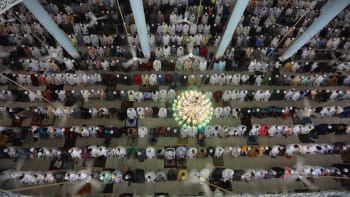Local Government – another Casualty of Deadlock
THE year 2014 and the 10th Parliamentary election are turning points in the political history of Bangladesh. The Westminster type parliamentary model practiced so far under a multiparty system since 1991, with many limitations and distortions, took a new twist as single party rule after the 10th Parliamentary election. The elections held in 2014 at national (10th Parliament and by-elections) and local level (Upazila Parishad elections) did not have credibility, inclusiveness and legitimacy. The 'Grand Alliance' under the leadership of Bangladesh Awami League (AL) and Prime Minister Sheikh Hasina took responsibility of presiding over the government, party and Parliament after the 10th Parliament election. The Grand Alliance runs the parliament with a 'brute majority,' and there is no credible opposition in the parliament.
The general election held in January 5, 2014, was boycotted by 28 out of 42 registered political parties. The political alliance led by the Bangladesh Nationalist party (BNP), which was in power three times and also alternatively played the role of opposition in the parliament twice since 1991, did not participate in the 10th Parliamentary election in protest against the 15th Amendment of the constitution that abolished the caretaker government (CTG) system. In spite of all this, the year 2014 passed apparently peacefully but with suspicious silence and hidden tension. There was less political agitation, but criticism and discomfort at home and abroad. The withdrawal of the World Bank from the Padma Bridge project, Corruption Perception Index (CPI) of Transparency International (TI) and various scams and scandals in the financial and banking sectors made headlines during the year. The European and North American diplomats were criticised for their stand on credible and inclusive election. The government created its own comfort zone by publicising the consistent growth rate of around 6% per annum, issues of social development, achievement of MDG goals, etc, as compensatory issues in facing the criticisms of its democratic credentials. To some extent, 'democracy' and 'development' were portrayed as trade-offs or alternatives to one another rather than being complementary.
The year 2015 started with political violence that reached unprecedented levels. There has been state violence through police brutality, together with participation of ruling party cadres on the one hand, and opposition political violence through oborodh (siege) and hartals (strike) along with bomb throwing, burning, killing and injuring people on the other hand, every day since January 5, 2015. The possibility of a 'political settlement' between the two opposing camps still seems remote and uncertain. The ruling regime is trying to stay in power at any cost and the opposing camp is determined to unseat them. So, policy making and improvement in governance are not on the political agenda of any camp at the moment.
The 9th Parliament (2009-2013) passed most of the Local Government (LG)-related acts, and a few rules were also issued by the government from time to time. So far, five sets of 'rules' for each of the institutions -- Upazila Parishad (UZP) and Union Parishad (UP) -- have been issued. The training for newly elected UZP representatives and officials was completed. Similarly, UP representatives and secretaries also received training and UZPs and UPs received increased amounts of funds under ADP and Local Government Support Project (LGSP) respectively. The offices of Director Local Government (DLG) and Deputy Director Local Government (DDLG) were streamlined and provided with a new ToR and logistics. Many other policy changes were promised by the government, such as appointment of one additional staff (accountant / assistant secretary) for UPs; transfer of funds of the government functionaries (17 department have already transferred their manpower) to the UZP; transfer of union level government employees to UPs as per provision of UP act 2009; formation of a 'Policy Advisory Group' at ministry level for initiating policy review, and strengthening of Monitoring and Evaluation (M&E) wing of the ministry for more effective monitoring of the Local Government Institutions (LGI) affairs. All the pending activities have been overshadowed by a 'political heat wave' of deadly confrontations for the time being. Unless a 'political settlement' is reached between the government and the opposition, any meaningful development in LG sector is a remote possibility.
There are many other unresolved issues in the sphere of local government and local governance. Some of the important steps and issues are:
* Holding of overdue elections in two City Corporations of Dhaka in a free, fair acceptable and inclusive manner;
* Election of reserved seats of women representatives in the UZPs;
* Issues of the reorganisation of Zila Parishads (ZP) and holding elections as soon as possible;
* Creating ownership of 'district budget' with the ZPs;
* Restraining the undue interference of law makers in the executive functions, especially in the domain of LGs (UP, UZP and ZP);
* Formulation of proper policy for making the transferred subjects functional at UZP level and properly implementing the provision of transfer system at the UP level;
* Initiation of integrated planning system at district, upazila and unions in line with five year plan strategies
The autonomy of LGI representatives after 10th Parliamentary election during the government's current term did not improve, rather LGI governance deteriorated further at upazila level. The role of officials, especially UNO, police, upazila engineer, etc', has become more aggressively or passively partisan. The political activists of the ruling alliance are playing a defacto role in different decision making process, such as enlistment of safety net receivers to the management of primary schools, high schools, madrassas and colleges with blessings from local MPs as well as management of institutions like UPs and UZPs. The Local Government Division (LGD) also supports the actions of the ruling party from behind the scene. In the last two years (2013-2014), there were many foreign trips in the name of 'study tour' under the sponsorship of LGD. Almost all officials of the LGD visited different countries of Europe along with a few 'administrators' of ZP, UZP, and chairmen and vice-chairmen belonging to the ruling party. Political affiliation of LGI leaders was the main criterion for selection of candidates for those trips. The resources for the trips were siphoned from the ADP allocation shown in the national budget in favour of LGIs (UZP and ZP) arbitrarily by the LGD. There were many suspensions, arrests and warnings to the representatives elected from the opposition. The work environment everywhere (UP, UZP, pourshava and city corporations) has become difficult to work in. Interference by the bureaucracy and party activists increased to an intolerable proportion. Even the UP chairmen and members and UZP chairmen and vice-chairmen belonging to ruling alliance are complaining against their own MPs and activists.
The innovations already made through many of the donor-assisted LG projects through different NGO partners in the process of wider replication are under threat, and the possibility of implementing new innovation is very unlikely if the current volatile situation continues. Nothing other than a 'political settlement 'of the current stalemate can put the policy makers and LG functionaries back on their feet, or to a point from where fresh thinking can be linked with the existing development. The donor community in general seems hesitant to think of further expansion of areas and activities at this juncture. Instead it may concentrate more on the consolidation and deepening of the interventions already made. Investment already made needs to be protected rather than wasting resources amidst the prevailing political uncertainty. This might have a negative impact on the general growth situation as well as continuity of growth and development at the local levels. After the MDG, the UN is formulating SDG for the period 2016-2030. We cannot afford to miss that train due to our internal political unrest and stalemate.
The writer is a leading Local Governance Expert, Director (Governance) MJF, and Honourary Fellow BIGD, Brac University. E-mail:[email protected]

 For all latest news, follow The Daily Star's Google News channel.
For all latest news, follow The Daily Star's Google News channel. 



Comments